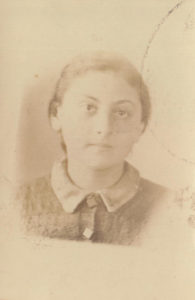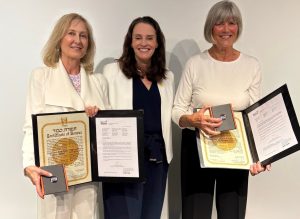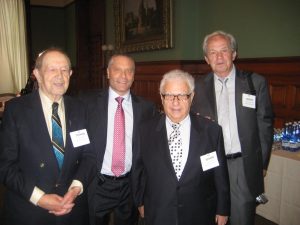What word would you use to describe a 40-year-old man who keeps two teenage girls in a wooden box under his pig barn, underground, with no space to sit up, and lets them out of their confinement only when he has sex with them?
That man, Victor, has been called “Righteous among the Nations,” the title given to gentiles who saved Jews during the Holocaust.
He was awarded this title because he and his sister Emilia did not give the Jewish girls away to the Germans, and thus saved their lives by hiding and feeding them. As a result, this horrific story is officially portrayed as one of heroism, rather than sexual violence.

Molly Applebaum, born in Poland in 1930, and her cousin Helen survived the war because a Polish family hid them for almost three years; first in a lean-to in the corner of the barn, and later, in the box under the pig sty. Molly, then 13-14, documented sex with Victor, in her diary, which she managed to keep throughout her hiding.
In 1948, Applebaum immigrated to Toronto. She supported Victor’s family financially for many years and also advocated for him to get the status of the Righteous. Fifty years later, she completed her memoir, which she devoted to the memory of her family and Victor and Emilia. It was published last year together with her original diary.

In mid-October 2018, The Azrieli Foundation hosted an academic conference in Toronto called “Buried Words” where Applebaum’s story and other case studies of documented sexual violence against Jewish men and women during the Holocaust were discussed.
One speaker, Paula David, professor of gerontology, who worked in the Baycrest Centre in the 1980s, spoke about secrets that Holocaust survivors revealed to her in their final years. Many of them had to do with sexual violence – stories that they could not tell their children, and others that their children did not want to be known.
The scholarly discussion that took place was blood-chilling. Sara Horowitz, professor of comparative literature at York University, and a CJN columnist, talked about a doctor raping a young girl while they were both in hiding. Doris Bergen, The Chancellor Rose and Ray Wolfe professor of Holocaust studies at the University of Toronto, spoke about the taboos faced by male victims of sexual violence.

Anyone with an Internet connection can now hear these lectures and learn the darkest secrets that Applebaum and other survivors did not share until very late in life.
The question is what do we do now? Do we talk about the little known story of sexual violence during the war, committed by rescuers, Nazis, and Jews themselves?
The truth is that we tend to do nothing. Fatigued by the countless heartbreaking, and usually somewhat rehearsed and repetitive information about the Holocaust that comes our way, we solemnly say “never again”, and go on about our lives.
The problem is that forgetting, ignoring, or pretending something does not exist only seems easier, but actually leads to bigger problems. It is not an accident that the Nobel Peace Prize of 2018 was given to Denis Mukwege and Nadia Murad, two outspoken fighters against sexual violence, still a weapon of modern warfare and genocide.
READ: A JEWISH GUIDE TO SURVIVING IN A SCARY WORLD
Holocaust survivors who shared their stories of sexual abuse not only lived through things no one wants to imagine, but overcame shame, guilt and societal expectations by testifying about what happened to them. They sacrificed their need to be remembered the way they could be – solely as parents, grandparents, professionals and loving individuals, but instead spoke about being victims of sexual violence.
They ensured that we, their descendants, have as much information about the dangers of war as they could provide. It is up to us now to thank them by reading, teaching, thinking and overcoming our informational overload by acknowledging that we need these stories to keep humanity alive.
Author

Anna Shternshis is the Al and Malka Green professor of Yiddish Studies and director of Anne Tanenbaum Centre for Jewish Studies, University of Toronto.
View all posts






